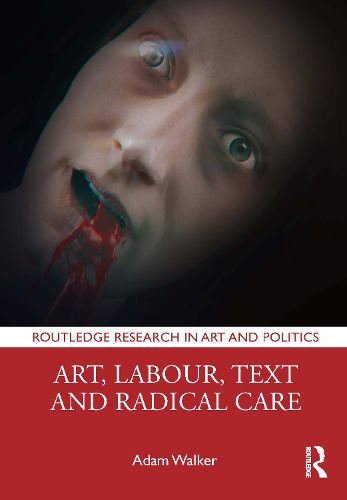Readings Newsletter
Become a Readings Member to make your shopping experience even easier.
Sign in or sign up for free!
You’re not far away from qualifying for FREE standard shipping within Australia
You’ve qualified for FREE standard shipping within Australia
The cart is loading…






Through developing an ethical-methodological approach of 'radical care', this book explores how critical artistic practice might contribute to the materialisation of more equal, more collectively fulfilling, possibilities of being.
The chapters trace a set of interweaving lineages perpetuating inequalities: through labour, the body, and onto-epistemology. Art's all too frequent a-criticality, cooption, or even complicity amidst these lineages is observed, and radical care and the disruptive arttext are developed as twin aspects of an alternative, resistant framework. The book contributes to the critical understanding of inequitable, abstracting processes' growing determination of increasing parts of our world, and foregrounds art's position amidst these. It also functions as an interface, both extending the fertile current discourse around care to a contemporary art focus, and at the same time exploring how radical art practices might contribute to a politics rooted in an ethics of care.
The book will be of interest to scholars working in art history, studio art, philosophy and politics.
$9.00 standard shipping within Australia
FREE standard shipping within Australia for orders over $100.00
Express & International shipping calculated at checkout
Through developing an ethical-methodological approach of 'radical care', this book explores how critical artistic practice might contribute to the materialisation of more equal, more collectively fulfilling, possibilities of being.
The chapters trace a set of interweaving lineages perpetuating inequalities: through labour, the body, and onto-epistemology. Art's all too frequent a-criticality, cooption, or even complicity amidst these lineages is observed, and radical care and the disruptive arttext are developed as twin aspects of an alternative, resistant framework. The book contributes to the critical understanding of inequitable, abstracting processes' growing determination of increasing parts of our world, and foregrounds art's position amidst these. It also functions as an interface, both extending the fertile current discourse around care to a contemporary art focus, and at the same time exploring how radical art practices might contribute to a politics rooted in an ethics of care.
The book will be of interest to scholars working in art history, studio art, philosophy and politics.